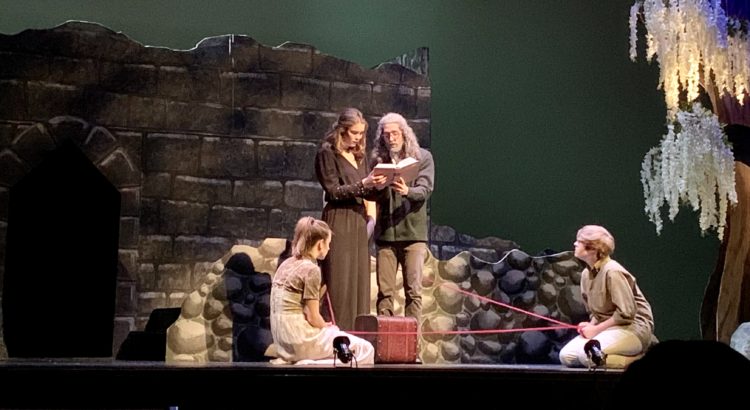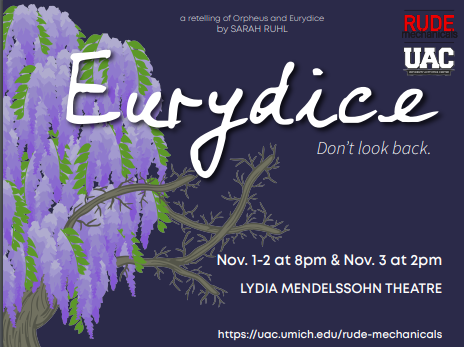“This is what it is to love an artist: The moon is always rising above your house. The houses of your neighbors look dull and lacking in moonlight. But he is always going away from you. Inside his head there is always something more beautiful.” – Sarah Ruhl, Eurydice
Eurydice read like bundle of freely associating thoughts and tasted, on occasion, cloyingly maudlin. Nevertheless, I appreciated the relative lightheartedness of this rendition that held it distinct from the tragic tone of the original tale of Orpheus and Eurydice, and its refreshing perspective shift to that of a female protagonist. Sarah Ruhl’s Eurydice not only rewrites but also seems to directly challenge the classic Greek myth; instead of being centered around the husband Orpheus’ (Kieran Westphal) epic journey to retrieve his wife Eurydice (Maggie Kuntz) from the depths of the Underworld, Ruhl centers the play around Eurydice’s personal experiences and the ultimate verdict she must make: returning to the living world with Orpheus or remaining in the Underworld with her father. In spotlighting her verdict, Ruhl allows Eurydice’s character the empowerment and dimensionality that the classic Greek myth denies her, whilst introducing themes beyond the frailties of human trust and spirit, such as the complexities and ephemeralities of memory, communication, language, and love.
Though the Rude Mechanicals‘ cast, direction, production, and design did an overall wonderfully impressive job in effectively conveying the refreshing eccentricities of Sarah Ruhl’s play, I couldn’t help but search for more within Ruhl’s dialogue and writing, which collaterally impaired the rhythm of the production. For some unperceived reason and for the entire duration of the production, I found myself either cringing at saccharine one-liners, snickering with the audience, or passively waiting for the closing of a scene. Though it’s plain to see that Ruhl intentionally chooses to structure Eurydice in a more painterly storytelling manner marked by freely associating motifs and ideas, I saw a disconnect between the intention of emotional release from the audience and certain syrupy moments in the production that occupied a disproportionate amount of stage time. It was during superfluously long scenes such as the Father unravelling the string ‘room’ he constructs for Eurydice that I felt the most passive in my viewing, and therefore disconnected from the emotions of defeat and hopelessness that the scene is meant to elicit.
Despite the slight awkwardness in timing and emotional translations, I enjoyed the red string motif present throughout the production. Intuitively, I interpret red string as a symbol of connection and of relationships impacted by fate – I thought that this motif translated especially well in the context of Ruhl’s Eurydice, in which the miscommunication and overall character differences between Eurydice and Orpheus are highlighted. This miscommunication and hesitance on Eurydice’s part is what ultimately causes Eurydice to call out and violate the rules Orpheus’ must follow in order to revive her. This scene appeared the most impassioned and dynamic to me; both Kuntz and Westphal beautifully portrayed the hesitancies and doubts both characters’ spirits were in turmoil with in the most artistic fashion. After expressively pushing and pulling with the string in a shifting, dance-like sequence, Eurydice eventually calls out to Orpheus, who turns back as the pent up tension from the mutual string-pulling comes to an abrupt climax and subsequently two simultaneous outbursts from each character. The cast’s various interactions with the red-string were notably artful and succeeded in showcasing the tension running through Eurydice and Orpheus’ strained marriage as well as the imperishable relationship between Eurydice and her Father.



